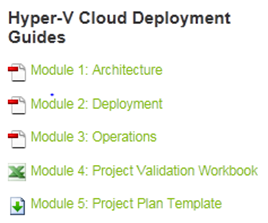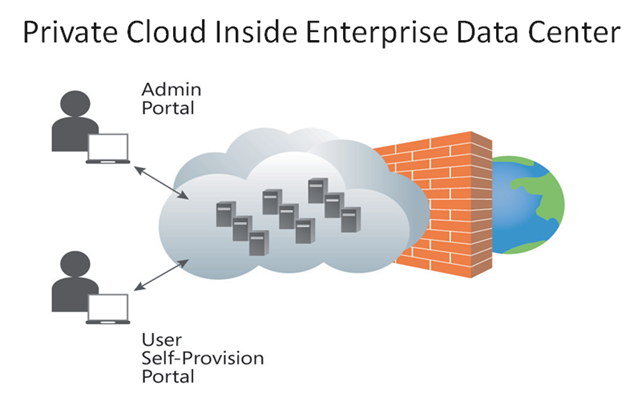What Is Private Cloud
If cloud computing is not confusing enough, there is also this so called private cloud. And what is private cloud? I am hoping at this time you have reviewed my Cloud Computing for IT Pros series and have a clear understanding of what a service is and what cloud computing is. These are key concepts. And equally important, you know the 5-3-2 Principle of Cloud Computing and why an application is a cloud application while others may not. Generally speaking, there are 5 essential characteristics, 3 delivery methods, and 2 deployment models (or 4 if following NIST definition) in cloud computing. Does not matter it is public cloud or private cloud. If it is classified as cloud computing, it should at least exhibit the 5-3-2 principle as the core set of attributes. With that in mind, so what is private cloud?
Private cloud? Well, it is a cloud, so the 5 essential characteristics of cloud computing apply. The term, private, here means dedicated and a private cloud is a cloud dedicated to an organization. The classification here is based on the intended users and not the ownership of the infrastructure. Namely, an organization has a dedicated cloud does not necessarily mean the organization must own the infrastructure on which a dedicated cloud is running. A obvious example is a private cloud running on an infrastructure owned and managed by a 3rd party hosting company. So a subscribing company may possibly own the data, software, configurations, and instances, but not the physical boxes and underlying infrastructure. To find out more of running private cloud in this fashion, a list of private cloud hosting companies is readily available.
Perhaps a more commonly assumed definition of private cloud is an on-premises deployment of cloud computing. In other words, all including the servers, cabling, software, running instances, etc. are owned and managed by an organization behind its enterprise firewall, as shown above. Many enterprises assume this definition of private cloud due to an existing deployment of on-premises IT resources. While transitioning into private cloud, it is a logical step to build one by employing already deployed hardware and software.
 Ultimately cloud computing is to better deliver applicaitons. The goal of constructing a private cloud can be acquiring IaaS, PaaS, or SaaS. Based on the objectives, an organization, for example, may simply seek the ability to efficiently deploy/manage servers to provide maximal flexibility for develoying and testing applicaitons, and in this case IaaS is what and all the organization needs. While the servers are deployed via IaaS, applications running within these servers do not have to be cloud applications. The applications can very well be traditional (i.e. non-cloud computing) ones. The point is that to pursue a private cloud, it is not necessarily to acquire all three (IaaS, PaaS, and SaaS) delivery methods. Nevertheless, for enterprise it is only logical to start with IaaS to fundamentally and strategically convert existing IT establishments into a cloud-ready environment. For pursuing a private cloud, IT should have IaaS in place first which will fundamentally provide the mechanism for resource pooling, scalability, and elasticity.
Ultimately cloud computing is to better deliver applicaitons. The goal of constructing a private cloud can be acquiring IaaS, PaaS, or SaaS. Based on the objectives, an organization, for example, may simply seek the ability to efficiently deploy/manage servers to provide maximal flexibility for develoying and testing applicaitons, and in this case IaaS is what and all the organization needs. While the servers are deployed via IaaS, applications running within these servers do not have to be cloud applications. The applications can very well be traditional (i.e. non-cloud computing) ones. The point is that to pursue a private cloud, it is not necessarily to acquire all three (IaaS, PaaS, and SaaS) delivery methods. Nevertheless, for enterprise it is only logical to start with IaaS to fundamentally and strategically convert existing IT establishments into a cloud-ready environment. For pursuing a private cloud, IT should have IaaS in place first which will fundamentally provide the mechanism for resource pooling, scalability, and elasticity.
 Microsoft private cloud solutions is called Hyper-V Cloud. Which is a set of guidelines as shown here on the right and offerings on building private cloud with IaaS using readily available technologies, i.e. Windows Server 2008 R2 and System Center Virtual Machine Manager. Hyper-V Cloud is exciting since not only it increase the ROI on existing deployment, it also strategically places a foundation to integrate Windows Azure platform offered in public cloud. Ultimately, enterprise will be able to manage physical, virtualized, and cloud (private and public) with a single pane of glass provided by System Center.
Microsoft private cloud solutions is called Hyper-V Cloud. Which is a set of guidelines as shown here on the right and offerings on building private cloud with IaaS using readily available technologies, i.e. Windows Server 2008 R2 and System Center Virtual Machine Manager. Hyper-V Cloud is exciting since not only it increase the ROI on existing deployment, it also strategically places a foundation to integrate Windows Azure platform offered in public cloud. Ultimately, enterprise will be able to manage physical, virtualized, and cloud (private and public) with a single pane of glass provided by System Center.
Above all, it does not matter if the delivery method is IaaS, PaaS, or SaaS. As far as a user is concerned, whatever your service/application is, it is always SaaS even if your application is not cloud-based. Application is what this is all about. So when it comes to implement private cloud which will eventually change how your IT delivers services, it is an expensive proposition on both cost and customer satisfaction. Be clear on short-term checkpoints and long-term business goals. Scope down but be very strategic in overall implementation.

